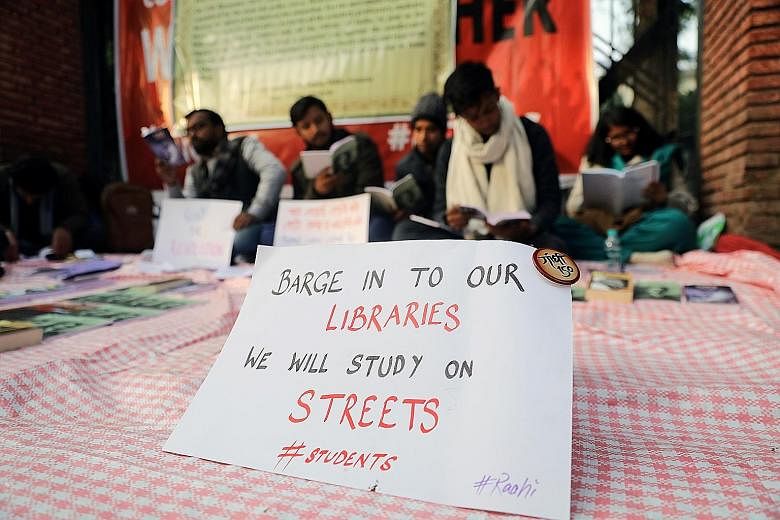Ms Anushka Gupta's parents think she is spending her winter break hanging out with her friends.
But the Delhi University student has taken part in two protests against the Citizenship Amendment Act (CAA), although she has not told her parents, who support Prime Minister Narendra Modi's Bharatiya Janata Party (BJP).
"It is because they are concerned about my safety. But also because they don't support this cause," said Ms Gupta, 20. "They have very mixed opinions regarding CAA. We have had a lot of fights regarding their support for the BJP."
The Act gives citizenship to non-Muslim illegal immigrants from Afghanistan, Bangladesh and Pakistan. Convinced it is inimical to the interests of the nation and a threat to India's secular Constitution, students from the country's top colleges and universities have joined widespread protests against it.
Many were also angered by the police who entered the campuses of Jamia Millia Islamia University in Delhi and Aligarh Muslim University in Uttar Pradesh on Dec 15 while chasing anti-CAA protesters.
The police, who said they were trying to bring violent protests under control, have faced claims of excessive action against students. One student lost his vision in one eye following the crackdown.
"There was some dissatisfaction (with the government) but there was no (students') movement as such. The anger erupted on Dec 15," said Ms Zoya Khan, 22, from Jamia Millia Islamia University.
"What we are angry about is this (CAA) law and also the way the government responded and the way they targeted universities."
India's public institutions are no stranger to student protests. In 2016, students at the Film and Television Institute of India protested for four months after Mr Gajendra Chauhan, a little-known actor affiliated to the BJP, took over as the institute's head.
In 2017, there was a nationwide uproar over the suicide of student leader Rohith Vemula at Hyderabad University.
Mr Vemula, who was from an impoverished background, took his life after his scholarship money was cut off and he was suspended over a tiff with the Akhil Bharatiya Vidyarthi Parishad, a right-wing student outfit affiliated to the Rashtriya Swayamsevak Sangh, the ideological backbone of the BJP.
Jawaharlal Nehru University (JNU), which is known for its liberal and left-leaning politics, has also seen student unrest, most recently over its decision to raise accommodation fees by over tenfold.
The CAA protests have now united colleges and universities.
"This is basically a culmination of everything - from massive unemployment, the fee hikes and question of quality education accessible to all. Students from private universities who have never protested took placards and stood in protest," said Mr N. Sai Balaji, a PhD student at JNU and national president of the All India Students' Association, a left-wing student organisation.
"Once (the protests) started, students just stood with students. There were no caste, religion or gender differences. This is the beauty of this movement. Students are saying our country's citizenship cannot be based on religion."
Over 50 per cent of India's population is below the age of 25. For Mr Modi, young Indians have proved to be a major support base. The BJP and its affiliates have accused opposition parties of propping up students, a charge that many students The Straits Times spoke to denied.
For many, worries over the CAA have added to concerns over a slowing economy and the lack of jobs.
"We were afraid of global warming and the economy... But now, there is CAA," said Mr Utkarsh Tripathi, 20, a political science student from Delhi University.
"At a time when we should be concerned about job security and our future, we are talking about communal issues. This is ethically, morally wrong."

